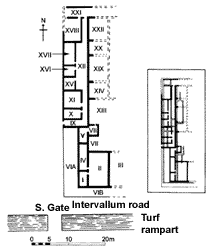
Click on the image for a larger version.
|
Image
details:
Period 3 at Vindolanda
Image ownership:
© Vindolanda Trust |
Date: AD 97-105
This phase of development probably represents a renovation rather
than a wholesale reorganisation of the fort. The gateway was moved
to the west because of subsidence into the ditch of the Period 1
fort. The praetorium was the best preserved of the buildings
excavated in any phase. Quality of construction was much improved
in comparison to the previous period. Dressed oak was used for structural
timbers and some rooms were floored with timber planking. As before
there was extensive evidence for craft activity, including metal-
and leatherworking. This may signify that the building was the fort's
workshop (fabrica), a building similar in plan to a praetorium.
However discovery of the correspondence of the garrison commander,
Flavius Cerialis, as well as letters belonging to his wife Lepidina,
suggest that the building is the praetorium. The excavated
area section was perhaps the service wing.
Most writing tablets were excavated in period 3 contexts. Many
were found in the yard and road immediately adjacent to the praetorium,
in particular amongst the remains of bonfires which had failed to
consume the tablets and other rubbish placed on them. The ninth
cohort of Batavians and possibly other units garrisoned Vindolanda
in this period, including the third cohort of Batavians (263,
311).
The most frequently attested individual in the tablets, Flavius
Cerialis, was prefect of this cohort around AD 100. Cavalry mentioned
in tablet (159)
might be part of this cohort (if it was a 'part-mounted unit') or
might be from another unit. In 104, both the third and ninth cohorts
were moved to the Danube region in the preparations for the second
campaigns by the emperor Trajan against the Dacians in what is now
Romania (AD 105-106).
Tablet database link: Browse the tablets found in Period 3.
|